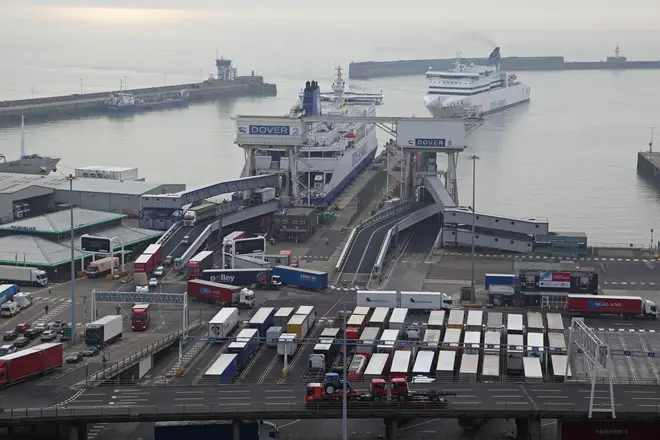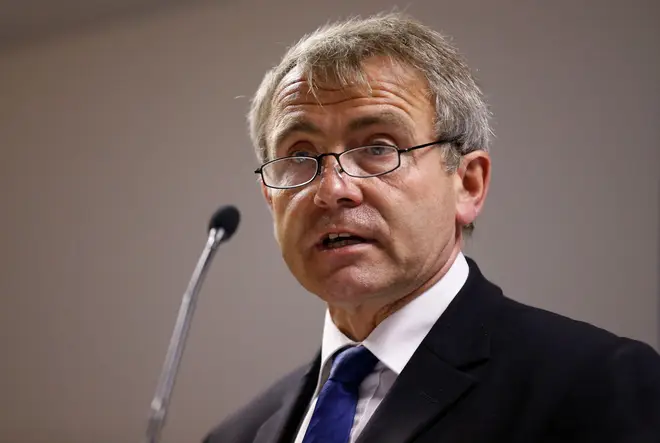
Iain Dale 7pm - 10pm
31 January 2024, 08:14 | Updated: 31 January 2024, 09:14

Dangerous diseases could enter the UK via illegally shipped food amid funding cuts to a key port as new post-Brexit checks come into force, a senior MP has warned.
Chilled and frozen meat and fish, cheese and dairy products, as well as some cut flowers now need an export health certificate, before they can enter the UK.
The same goods will require a physical check at the UK border before they can enter.
Imports from the UK have faced similar checks when coming into the EU since the start of 2021, but the UK has delayed imposing controls on goods coming the other direction.
But just before the new system came into force, the environment, food and rural affairs select committee wrote to Steve Barclay, the secretary of state for the department, to express unease about the preparations the government has made.
Chief among them was that funding for the port of Dover, which will be responsible for the checks, is set to be slashed by 70% in April.
Read more: Boris Johnson's booze bill for Brexit bash at No10 revealed after two-year legal battle

James O'Brien highlights the 'political imbecility' of Brexit amid new import checks
The select committee's chairman Sir Robert Goodwill told LBC News: "We are concerned that the funding for Dover - these checks are being carried out by the local authority at Dover - the funding is going to be cut by 70%.
"We've already had spot checks taking place and they've picked up quite a lot of illegal meat, nearly 60 tonnes, in fact over the Christmas period about 5 and a half tonnes of illegal meat.
"And we're concerned that without the correct funding, those spot checks won't pick up things are wrong. If we were to get African swine fever or, God forbid, foot and mouth into this country, that would be catastrophic, both for taxpayers and for the price of food".
The Dover Port Authority has itself expressed concerns about the plan and the funding cuts.
Under the new system, named the Border Target Operating Model, health checks on foods arriving at Dover will be carried out at a facility in Sevington, Kent - over 20 miles from the coast.

Sir Robert told Mr Barclay: "Your Department informed us that Sevington will provide a modern and purpose-built site for goods and live animals that arrive through both the Port of Dover and Eurotunnel.
"Defra's justification appears to be that it is located to support the smooth flow of goods out of both points of entry without disrupting traffic flows out of the Port of Dover.
"However, the inland border facility at Sevington will require vehicles to travel 22 miles unsupervised across Kent, presenting potentially serious biosecurity risks, but also compromising compliance.
"We understand that drivers will be under no obligation to go to Sevington, if asked to do so. As such, we have real and reasonable concerns about the geographic dislocation of the inland border facility from the point of entry."
A government spokesperson said: "We have strict border controls in place to protect food and animal health safety and these, along with our high biosecurity standards, remain unchanged.
"Following careful consideration of the options for border control posts in Kent, we announced our intention to consolidate physical controls at the inland border facility at Sevington.

'They are liars, incompetent, and they don't have a clue,' says Spanish businesswoman
"We are confident that Sevington will have the necessary measures in place to appropriately mitigate biosecurity risks that relate to this facility being located away from the point of entry."
Concerns have also been raised about the checks causing food supply chain problems and price rises.
But Home Secretary James Cleverly said that there would be no gaps on supermarket shelves as a result of the new regime.
Speaking on a visit to Paris, he said: "The UK has always been a consumer of international products and unsurprisingly French products are very, very popular in the UK. We're not going to lose that appetite.
"We're going to make sure that these sensible, responsible checks are done in a way that makes no interruption to the supply of food to the shelves, so people don't need to worry about that.
"We of course want to make sure that we maintain good quality food available on the shelves and we've always been able to do that. And we will continue doing that now."
Rules are set to be updated further in the months to come.
By April 30, medium-risk animal products from the EU will undergo documentary, identity and physical checks.
From October 31, safety and security declarations for EU imports will become mandatory, along with a more streamlined dataset for imports.